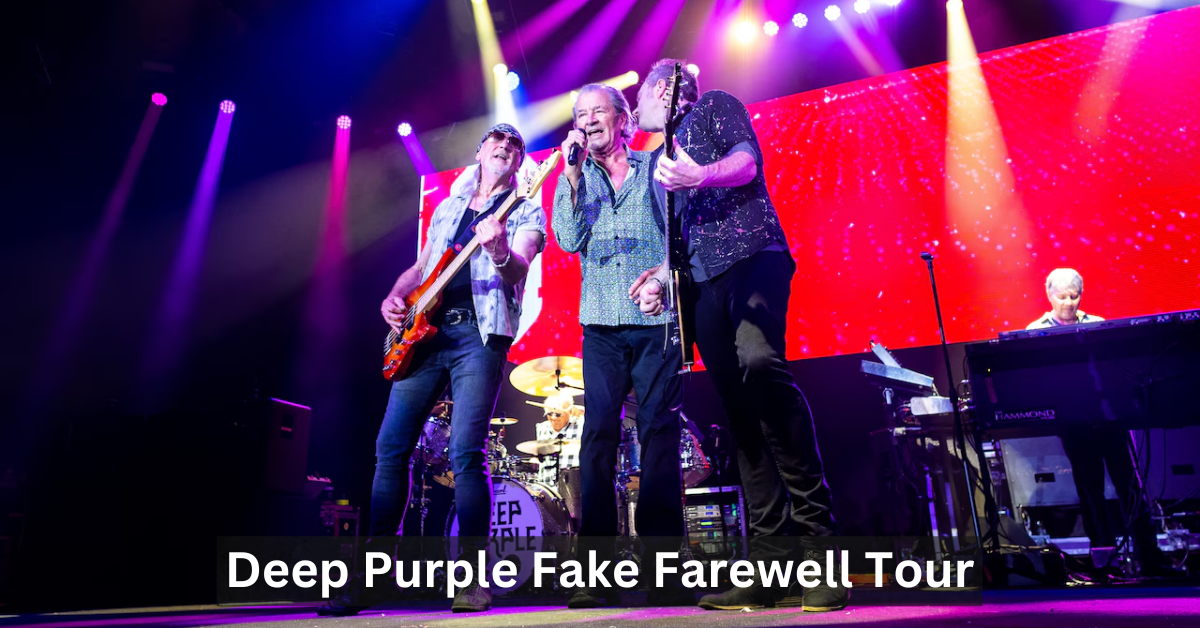In the world of rock music, farewell tours have become a common yet controversial phenomenon. As bands age and their members navigate life’s changes, the promise of a final tour often captivates fans. However, these tours sometimes blur the lines between farewell and continuation, creating a complex narrative around iconic bands like Deep Purple. This article explores the “Deep Purple Fake Farewell Tour,” analyzing its origins, marketing strategies, band history, and the emotional connection with fans.
Farewell tours have become a staple in the rock music landscape, serving as poignant goodbyes for both bands and their fans. These tours often create a sense of urgency, prompting fans to attend one last show before their favorite artists hang up their guitars. The emotional weight of a farewell tour is palpable, as fans seek closure and a final opportunity to connect with the music and its creators.
For many bands, a farewell tour also functions as a clever marketing strategy. By framing a tour as a final goodbye, bands can boost ticket sales and generate buzz. However, this strategy can backfire, leading to skepticism among fans when bands return to the stage. Deep Purple’s “Long Goodbye Tour” exemplifies this phenomenon, raising questions about the sincerity of farewell tours in rock music.
The Origins of the Deep Purple Fake Farewell Tour
Deep Purple, one of the pioneering bands of the hard rock genre, began their “Long Goodbye Tour” in 2017. This tour was heralded as a farewell to their decades-long career, allowing fans to celebrate the band’s rich history and musical evolution. As the tour progressed, it became evident that the band was not ready to completely step away from the stage.
The tour included numerous performances across the globe, giving fans a chance to experience Deep Purple live. However, as the band continued to add dates and announce new concerts, whispers of a “fake farewell” began to circulate among fans and critics alike. The initial excitement turned into confusion, leaving many to question the validity of their farewell tour.
Initial Reactions from Fans and Critics
Fan reactions to the “Long Goodbye Tour” were initially filled with enthusiasm. Many flocked to purchase Deep Purple farewell tour tickets, eager to witness the legendary band’s last performances. However, as the tour extended and new dates were added, a sense of betrayal emerged. Social media platforms became a battleground for opinions, with fans expressing both their love for the band and frustration over the perceived deception.
Critics also weighed in, analyzing the marketing tactics employed by the band. Some viewed the extended tour as a smart business move, while others condemned it as a manipulation of loyal fans. This duality in perception highlighted the complex relationship between Deep Purple and its audience.
Deep Purple’s Legacy in Rock Music
Since their formation in 1968, Deep Purple has left an indelible mark on rock music. They are often credited with pioneering the heavy metal sound, blending hard rock with classical influences. Their groundbreaking albums, such as Machine Head and In Rock, showcase their innovative approach and musical versatility.
The band’s legacy is characterized by their powerful live performances and classic hits like “Smoke on the Water” and “Highway Star.” These songs not only defined an era but also influenced countless musicians across various genres. As a result, Deep Purple is celebrated not just as a band but as a significant force in the evolution of rock music.
Notable Achievements and Contributions to Rock
Deep Purple’s contributions to rock music extend beyond their musical style. They have garnered numerous awards, including a place in the Rock and Roll Hall of Fame, recognizing their influence and legacy. Additionally, their innovative use of instrumentation, particularly the incorporation of keyboards and organ, set them apart from their contemporaries.
The band’s ability to adapt to changing musical landscapes while retaining their unique sound has ensured their relevance over the decades. Their discography, filled with both studio albums and live recordings, remains a testament to their enduring impact on rock music.
Marketing Strategies Behind the Tour
The concept of a farewell tour serves as a powerful marketing strategy in the music industry. By announcing a final tour, bands can create a sense of urgency among fans, driving ticket sales and generating substantial media coverage. This approach can reinvigorate a band’s brand, allowing them to capitalize on nostalgia while attracting new listeners.
Deep Purple’s “Long Goodbye Tour” illustrates how effectively this strategy can be employed. The promise of a last chance to see the band live resonated with audiences, leading to sold-out shows and increased merchandise sales. However, this strategy also raises ethical questions about the authenticity of the farewell.
Comparison with Other Bands’ Farewell Tours
When comparing Deep Purple’s farewell tour to those of other iconic bands, similarities and differences emerge. Bands like The Rolling Stones and KISS have also embraced the farewell tour concept, often returning to the stage after claiming it was their last. This pattern can lead to fan disillusionment and skepticism, as audiences may question the sincerity of these declarations.
Despite these comparisons, Deep Purple’s unique history and musical evolution differentiate their approach. While their farewell tour may share elements with those of other bands, the emotional connection they maintain with their fans sets them apart. This connection is crucial for sustaining their legacy and ensuring continued support, even amid the controversy surrounding their tour.
Band Members and Their Roles
The lineup of Deep Purple has undergone numerous changes over the years, with several iconic members shaping its sound. Ian Gillan, the band’s lead vocalist, has been a pivotal figure in defining Deep Purple’s identity. His powerful voice and charismatic stage presence have contributed significantly to the band’s success.
Roger Glover, the bassist, is known for his songwriting and production contributions, adding depth to the band’s musical compositions. Other key members, including drummer Ian Paice, who has been with the band since its inception, and current keyboardist Don Airey, have played crucial roles in maintaining Deep Purple’s distinctive sound. Each member’s contributions create a rich tapestry of music that resonates with fans.
The Significance of Each Member in Shaping Deep Purple’s Sound
The unique contributions of each band member have been instrumental in shaping Deep Purple’s sound over the years. Gillan’s soaring vocals paired with Blackmore’s innovative guitar riffs created a signature sound that redefined rock music. Glover’s basslines provided a solid foundation for their music, while Paice’s drumming anchored the band’s rhythm.
Moreover, the influence of past members, such as David Coverdale, continues to spark discussions among fans about the “best” Deep Purple vocalist. The different styles and contributions of each member showcase the band’s versatility and adaptability, ensuring their music remains relevant and engaging.
The Reaction to the “Fake” Farewell
As Deep Purple continued to tour despite their “farewell” label, fan reactions varied widely. Many loyal fans welcomed the opportunity to see the band live, relishing every performance as a gift. For these fans, each concert is a chance to celebrate the music that has played a significant role in their lives.
Conversely, some fans expressed disappointment and frustration, feeling misled by the notion of a farewell. The emotional connection many have with Deep Purple complicates their response to the tour. While some view it as a betrayal, others appreciate the band’s ongoing presence in the rock music scene, highlighting the complexity of fan relationships in the music industry.
Analysis of Social Media Reactions and Discussions
Social media has become a vital platform for fans to voice their opinions about the “fake farewell.” Discussions range from excitement about upcoming concerts to debates about the ethics of extended farewell tours. This dialogue reflects the passionate investment fans have in the band’s journey, showcasing the emotional connection that transcends mere entertainment.
These discussions often reveal a deeper understanding of the band’s legacy and the significance of their music. Fans share personal stories of how Deep Purple’s songs have influenced their lives, reinforcing the band’s impact on rock culture and emphasizing the importance of a genuine connection between artists and their audience.
The Best Deep Purple Vocalist Debate
One of the most enduring debates among Deep Purple fans is the comparison between Ian Gillan and David Coverdale as the best vocalist for the band. Gillan’s powerful and dynamic vocal range defined many of Deep Purple’s classic hits, while Coverdale brought a different sensibility during his tenure with the band.
Fans of Gillan often cite his contributions to defining Deep Purple’s sound and the iconic status of songs like “Child in Time.” On the other hand, Coverdale’s era is celebrated for hits like “Burn,” showcasing a different side of the band’s musical evolution. This debate highlights the diverse influences and interpretations of the band’s music over the years.
Influence of Different Vocalists on the Band’s Music and Identity
The varying styles of Gillan and Coverdale have played significant roles in shaping Deep Purple’s musical identity. Each vocalist brought a unique approach to the band’s sound, reflecting the changing dynamics of rock music across decades. Gillan’s operatic style contrasts with Coverdale’s bluesy rock influence, illustrating the band’s versatility.
This rich vocal history contributes to the ongoing appreciation of Deep Purple’s discography, with fans embracing the evolution of their sound. The emotional connections formed through these different eras showcase the depth of Deep Purple’s music and the lasting impact it has on listeners.
Upcoming Tours and Future Plans
Following the extended discussions surrounding the “Long Goodbye Tour,” Deep Purple announced their “One More Time Tour,” which has sparked renewed excitement among fans. This tour promises to deliver a celebration of their enduring legacy, with promises of classic hits and fan favorites. This tour serves as an opportunity for both the band and their audience to relive the magic of Deep Purple’s music one last time—at least, that’s the intention behind the tour’s title.
Speculation About Future Projects
As fans eagerly anticipate the “One More Time Tour,” there is speculation about potential future projects, including new music or collaborations. While band members have hinted at the possibility of recording new material, they remain noncommittal, leading to a mixture of excitement and uncertainty among fans. The ongoing evolution of Deep Purple’s sound suggests that, despite the farewell label, the band is not entirely ready to fade into the background.
Conclusion
The “Deep Purple Fake Farewell Tour” exemplifies the complex interplay between rock music, fan expectations, and marketing strategies. As Deep Purple continues to navigate their legacy and the perception of their farewell, they remain a significant force in the music industry. The emotional connection they foster with their audience, coupled with their innovative sound and storied history, ensures that Deep Purple will continue to be celebrated, regardless of their touring status.
Frequently Asked Questions
Is the “Long Goodbye Tour” truly Deep Purple’s last tour?
While marketed as a farewell, the tour has seen extensions and new announcements, leading to speculation about future performances.
Who are the current members of Deep Purple?
The lineup includes Ian Gillan, Roger Glover, Ian Paice, Don Airey, and Steve Morse, each contributing to the band’s distinct sound.
What are some of Deep Purple’s most famous songs?
Iconic tracks include “Smoke on the Water,” “Highway Star,” and “Child in Time,” which have left a lasting impact on rock music.
How have fans reacted to the ongoing tours?
Reactions are mixed, with some fans thrilled to see the band live again, while others feel misled by the extended farewell claims.
What can fans expect from the “One More Time Tour”?
Fans can anticipate classic hits, memorable performances, and a celebration of Deep Purple’s rich musical history.
Stay in touch to get more updates & alerts on TGTube! Thank you



